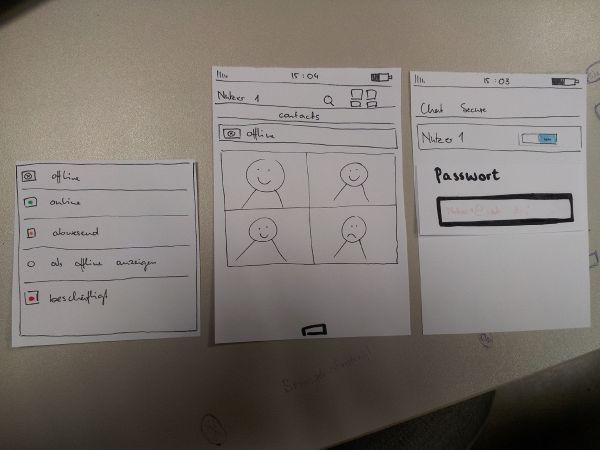No edit summary |
No edit summary |
||
| Line 90: | Line 90: | ||
''Lisa, Susanne, Michèle:'' | ''Lisa, Susanne, Michèle:'' | ||
[...] | |||
| Line 98: | Line 98: | ||
This thursday (12.12.13) we want to speak about what problem we want to solve. | This thursday (12.12.13) we want to speak about what problem we want to solve. | ||
'''[[Images]]''' | |||
[[File:Prototyp Anmeldeprozess.jpg|600px]] | |||
Our first prototype for the login process | |||
Revision as of 11:11, 12 December 2013
Aims of data gathering
Michèle:
We wanted to know how important security is for students at our age, what they expect from chat apps and what their problems/whishes are. Main focus was also the question of authenticity. For that reason we started to interview a few people from our social environment.
Susanne:
In my interviews I asked about the chat habits and especially focused on how important authenticity is for them and how authenticity is mediated.
Lisa:
I talked to two people (Students of Computer Science an Media) and asked them about their daily chat behavior and the aspect of authentication.
Data gathering: Interviews/Observation
Michèle:
Interviews: I interviewed two female students of media sciene, both 19 years old. I focused on security of chat apps and asked about their attitude towards this topic. The central questions were:
- How important is security for you while chatting with people?
- What measures do you probably adopt to be safe?
- What functions and design features do you find most important for a chat app?
Observation:
Parallel to that task we examined the app "chat secure" and noticed some problems of handling. We started to think about how we can improve the login because it is too inconvenient.
Susanne:
I interviewed 3 girls (students of Media-Arts/Media-Design) in the age of 19. The main questions were:
- What chat apps/programs do you use?
- How often do you use them and how important they are for you?
- Where do you see advantages and disadvantages of your favorite chat program?
- How important authentication is for you?
- How should a trustable profile be? What information are important?
- In what situations you prefer the phone or an E-Mail before chatting?
- What are requirements for you to use a new app with guaranteed security?
Lisa:
First I ask about the chatprogramms my interview partner use in their daily life an what is important for them to use them. Which aspects are important for the design. Afterward they should specify which chatprogramm they use for one-on-one interviews and which for group discussion. The next big topic was security. I asked them if they had thought about it. And what they did for their security. The last topic was how they imagine authentication.
Data Analysis & Main Results
Michèle:
- The user wants to know if the chat partner read the messages.
- The user wants a simple, intuitive, neatly arranged design, which looks uniform on all gadgets.
- It would be useful to have a password for the app.
- The user wants to send out photos/videos.
- The user wants to use a lot of smileys.
- The function "writes..." is not necassary.
- The user wants to use an app/program which is used by a lot of people.
- The app should be for free.
- The user wants to have a security warranty.
- Authenticity doesn't loom large for students personally.
- It is important that apps are immune from viruses.
Susanne:
- The user wants an interface, where you can see who is online at the moment and when a contact was online the last time.
- (To much) Personalized advertising makes the user feel insecure.
- A “real” profile picture is soothing for the user.
- If you want a trustworthy profile you have to find a good balance between too much and too little information.
- It’s more comfortably to chat than to phone with somebody.
- For the user it’s important to be up-to-date and flexible with messages. So he/she prefers an app for chatting.
- Because of misunderstandings in chat, some users prefer a phone call for personal discussions.
- Some other users prefer the phone because think the chat-partner reads the message too late.
- Important information, link, photos, videos, … are often sent by E-Mail.
- Distrust towards apps results e.g. from missing knowledge about safety and smart phone-apps.
- People use safety-options of social networks (e.g. Facebook) but don’t know, if they really work.
What specifc problem we want to solve
Lisa, Susanne, Michèle:
[...]
Plans – how we want to solve the problem(s)
This thursday (12.12.13) we want to speak about what problem we want to solve.
